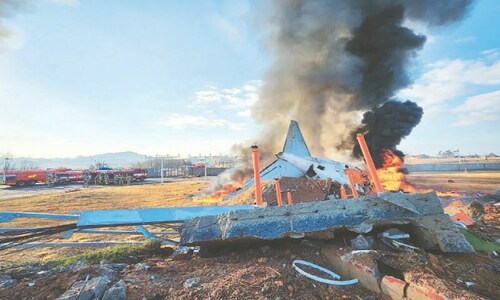ISLAMABAD: Within a span of five days, the country’s political leadership yet again expressed its unequivocal solidarity with the people of India-held Kashmir through a resolution passed at the parliament’s joint sitting on Friday.
The contents of the resolution were more or less the same as those of the previous one endorsed at a multiparty conference held on Monday. However, this time the difference was the absence of lawmakers from the Pakistan Tehreek-i-Insaf (PTI).
Likewise, Prime Minister Nawaz Sharif was absent from the sitting — a fact duly noticed by Syed Khurshid Shah, the leader of the opposition. Rows of empty chairs marked the sitting towards its fag end when Sartaj Aziz, the prime minister’s adviser on foreign affairs, read out the unanimously accepted resolution on Kashmir.
According to the Free and Fair Election Network’s (Fafen) daily fact sheet, 120 parliamentarians (27 per cent) were present at the outset and 85 (19pc) at the adjournment of the sitting.
Indian claim of ‘surgical strike’ rejected
Mr Shah said that although his party had supported the resolution, the irony was that Prime Minister Nawaz Sharif and senior members of his cabinet preferred to miss such an important occasion. “I am genuinely saddened to see empty seats, especially of the ruling party members.”
Besides condemning the Indian army’s atrocities against unarmed Kashmiris, parliament unanimously called upon the international community “to play its due role in stopping the bloodshed in the Indian occupied Jammu and Kashmir, in carrying out an independent investigation of the human rights violations committed by India and to ensure the implementation of UN Security Council resolutions to enable the people of Jammu and Kashmir to exercise their inalienable right to self-determination.”
The resolution highlighted that during the ongoing violence in held Kashmir, 110 people had lost their lives, over 12,000 suffered severe injuries, including more than 700 who had sustained eye injuries and 150 permanent blindness.
Once again through the resolution, the country’s political leadership asked its Indian counterpart to fulfill their Kashmir specific obligations. The resolution said: “The joint sitting of the parliament urges the Indian government to immediately stop terrorising innocent people and fulfill its international human rights and international humanitarian law obligations as well as commitments under the UN Security Council resolutions.”
In the follow-up paragraph, the resolution rejected “ludicrous Indian claims of carrying out surgical strike across the LoC as blatantly false and brazen attempts at diverting international attentions away from its atrocities in occupied Kashmir”.
The sitting also condemned threats by India to use water as a weapon against the people of Pakistan.
At the same time while rejecting Indian accusations against Pakistan for its involvement in the Uri incident, the resolution condemned Indian connection to the terrorist acts inside Pakistan. It said: “We condemn India’s blatant interference and sponsorship of terrorism and subverting activities in Pakistan, as substantiated by the capture and confession of serving Indian naval officer from RAW, Kulbhushan Jhadav.”
The sitting also recommended that Jhadav’s matter be taken up with the United Nations. The joint sitting expressed its resentment over India’s designs to scuttle all diplomatic efforts for bilateral, as well as multilateral dialogue, manifest in its refusal to attend the Saarc summit.
In the concluding paragraph, the house once gain reiterated that “Pakistan is committed to a meaningful and result-orientated dialogue with India to resolve all outstanding issues, especially the core dispute of Jammu & Kashmir.”
PPP criticism
Before the presentation and passage of the resolution, PPP lawmakers made some impassioned speeches, urging the government to put its house in order as far the country’s diplomacy was concerned.
Senator Sherry Rehman, a former information minister and ambassador to the United States, wondered if the PML-N government was serious enough in pursuing an effective and aggressive foreign policy. “One odd speech at the UNGA will not serve the purpose, we need sustained efforts. Why didn’t the government timely highlight the capture of Kulbhushan Jhadav [the Indian spy]? Wasn’t it direct intervention inside Pakistan?” Senator Rehman said.
Although Senator Rehman made a veiled criticism of the PTI for not setting aside political differences even for issues like Kashmir, she asked the government to address whatever concerns the party had.
Senator Aitzaz Ahsan fulfilled his promise of donating Rs50,000 to the National Blind Foundation after a top government functionary — Sartaj Aziz — uttered the name of the Indian spy, Kulbhushan Jhadav.
Another veteran PPP lawmaker, Senator Taj Haider, asked the government to stick to its stance on Kashmir. At the same time, Senator Haider called upon the government to resolve the Panamagate scandal “in time”.
Published in Dawn October 8th, 2016














































